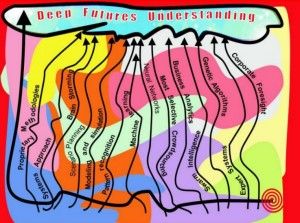Futurewise Success Tenets
“Futurewise Success Tenets” here is an excerpt from, “The Future of Scientific Management, Today”. To read the entire piece, just click the link at the end of article. As follows:
(1) Picture mentally, radiantly. (2) Draw outside the canvas. (3) Color outside the vectors. (4) Sketch sinuously. (5) Far-sight beyond the mind’s intangible exoskeleton. (6) Abduct indiscernible falsifiable convictions. (7) Reverse-engineering a gene and a bacterium or, better yet, the lucrative genome. (8) Guillotine the over-weighted status quo. (9) Learn how to add up ─ in your own brainy mind ─ colors, dimensions, aromas, encryptions, enigmas, phenomena, geometrical and amorphous in-motion shapes, methods, techniques, codes, written lines, symbols, contexts, locus, venues, semantic terms, magnitudes, longitudes, processes, tweets, “…knowledge-laden…” hunches and omniscient bliss, so forth. (10) Project your wisdom’s wealth onto communities of timeless-connected wikis. (11) Cryogenize the infamous illiterate by own choice and reincarnate ASAP (multiverse teleporting out of a warped / wormed passage) Da Vinci, Bacon, Newton, Goethe, Bonaparte, Edison, Franklyn, Churchill, Einstein, and Feynman. (12) Organize relationships into voluntary associations that are mutually beneficial and accountable for contributing productively to the surrounding community. (13) Practice the central rule of good strategy, which is to know and remain true to your core business and invest for leadership and R&D+Innovation. (14) Kaisen, SixSigma, Lean, LeanSigma, “…Reliability Engineer…” (the latter as solely conceived and developed by Procter & Gamble and Los Alamos National Laboratories) it all unthinkably and thoroughly by recombinant, a là Einstein Gedanke-motorized judgment (that is to say: Einsteinian Gedanke [“…thought experiments…”]. (15) Provide a road-map / blueprint for drastically compressing (‘crashing’) the time’s ‘reticules’ it will take you to get on the top of your tenure, nonetheless of your organizational level. (16) With the required knowledge and relationships embedded in organizations, create support for, and carry out transformational initiatives. (17) Offer a tested pathway for addressing the linked challenges of personal transition and organizational transformation that confront leaders in the first few months in a new tenure. (18) Foster momentum by creating virtuous cycles that build credibility and by avoiding getting caught in vicious cycles that harm credibility. (19) Institute coalitions that translate into swifter organizational adjustments to the inevitable streams of change in personnel and environment. (20) Mobilize and align the overriding energy of many others in your organization, knowing that the “…wisdom of crowds…” is upfront and outright rubbish. (21) Step outside the boundaries of the framework’s system when seeking a problem’s solution. (22) Within zillion tiny bets, raise the ante and capture the documented learning through frenzy execution. (23) “…Moonshine…” and “…Skunks-work…” and “…Re-Imagineering…” all, holding in your mind the motion-picture image that, regardless of the relevance of “…inputs…” and “…outputs,…”, entails that the highest relevance is within the sophistication within the THROUGHPUT.….. (69) Figure out exactly which neurons to make synapses with. (70) Wire up synapses the soonest…”
Read the full material at http://lnkd.in/bYP2nDC
Regards,
Mr. Andres Agostini
www.linkedin.com/in/AndresAgostini











